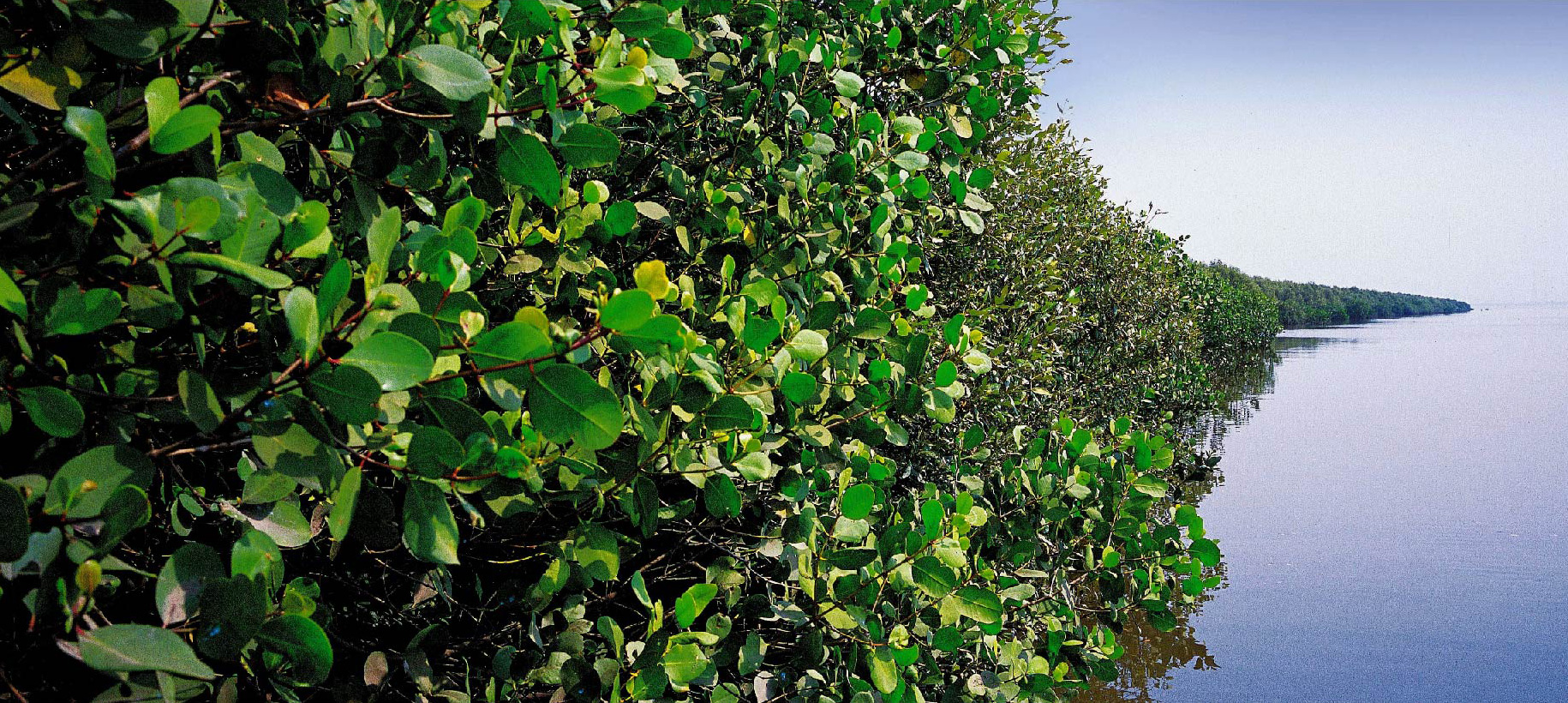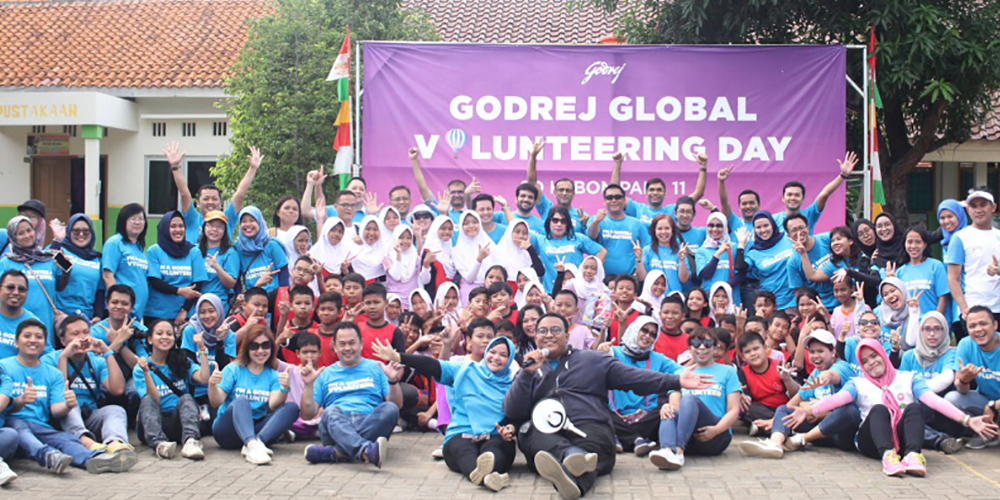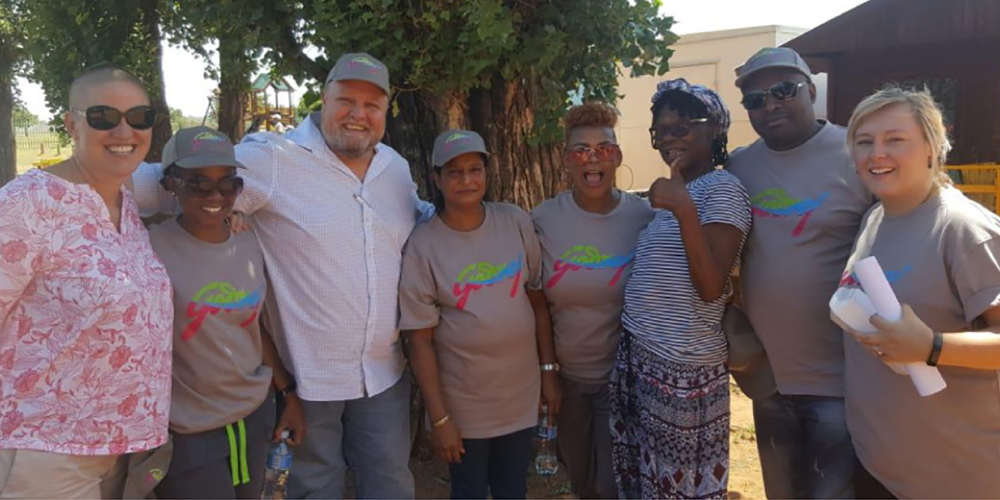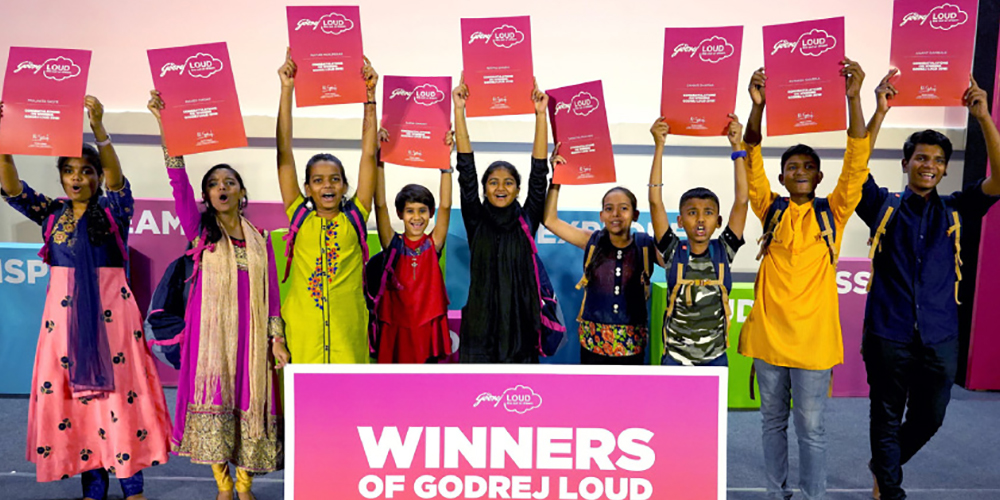INTEGRATED REPORT
MANAGEMENT DISCUSSION & ANALYSIS
Our Strategic Pillars
-
01
Extending leadership in our core categories and geographies - 02
Accelerating innovation and building purposeful brands - 03
Leveraging digital - 04
Enhancing go-to-market - 05
Making our supply chain best-in-class - 06
Fostering an inclusive, agile and high-performance culture - 07
Building a more inclusive and greener world
The Godrej Group owns and cares for nearly 2,100 acres of mangrove
forests in and around our headquarters in Vikhroli, Mumbai
Strategic Priority
Building an inclusive and greener world
Capitals Impacted
Risks
- Regulatory changes
- Social license to operate
- Community unrest
Enablers
- Good & Green vision
- Shared value approach
- Godrej values
- Godrej sustainability policies
- Godrej legacy of philanthropy
Key Focus Areas
- Optimum use of natural resources
- Anticipating and responding to emerging regulatory frameworks
- Building inclusive and prosperous communities
- Volunteering
Value created
We are conscious of both our dependence on and responsibility towards our communities and the environment, across the value chain and lifecycle of our products.
We remain committed to innovating and exploring new technologies to become more sustainable through enhanced Intellectual Capital.
We are working more closely with our communities and investing in social programmes to achieve our goals. We are also leveraging our Human Capital through employee engagement and volunteering efforts to maximise Natural Capital and Social & Relationship Capital.
GODREJ TRUSTS
Approximately 23 per cent of the promoter holding of the Godrej Group is held in trusts that invest in the environment, healthcare, and education.
Environment
We are proud to protect, develop, and maintain the largest privately managed belt of mangrove forests in Mumbai since the 1940s.
Education
The Godrej Udayachal Pre-Primary and Primary Schools focus on the all-round development of children. The Udayachal High School has been accredited with the International School Award in recognition of its global education curriculum and innovation in classroom teaching.
We also support Teach For India, a nationwide movement involving outstanding college graduates and young professionals, who commit two years to full-time teaching in under-resourced schools and become lifelong leaders working towards the pursuit of equity in education.
Healthcare
The Godrej Memorial Hospital aims to provide high-quality healthcare at affordable costs. One such initiative is our partnership with Smile Train, a USA-based NGO, which helps in performing corrective cleft lip and palate surgery in children from low-income families. We offer surgery and hospitalisation to these children free of cost.
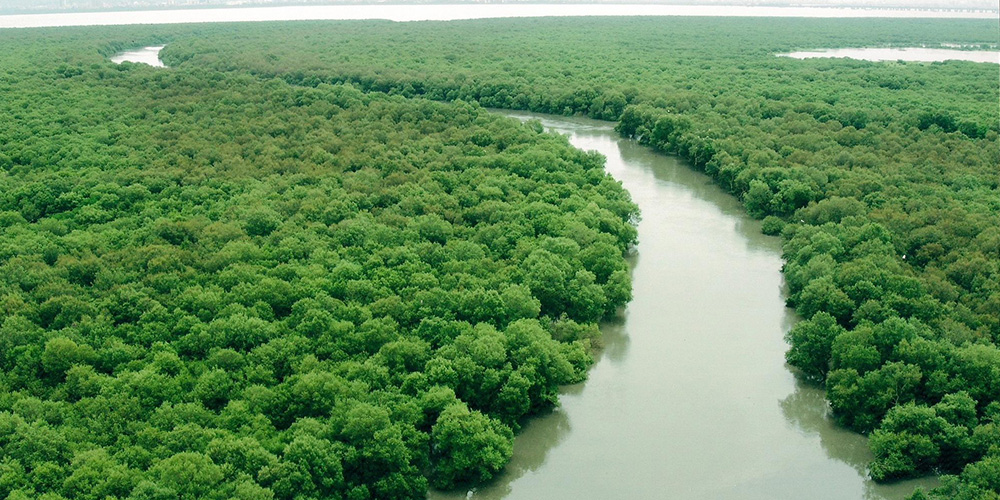
An aerial view of the Godrej Mangroves in Vikhroli, Mumba
GOOD & GREEN
Sustainability at GCPL is guided by the Godrej Group’s Good & Green vision of creating a more inclusive and greener world.
We have a comprehensive CSR policy* that outlines programmes and projects to create a positive impact on our stakeholders.
Our CSR committee reviews, monitors, and provides strategic inputs on our sustainability efforts.
Over the years, we have aligned our initiatives with the United Nation’s Sustainable Development Goals, the Government of India’s social development priorities, and the needs of our local communities to deliver high-impact programmes.
Key focus areas and corresponding initiatives
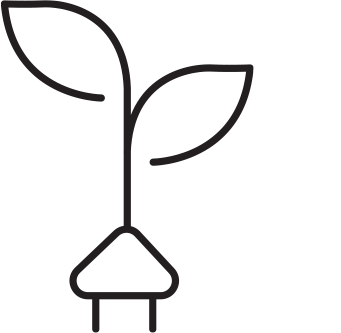
- Optimum use of natural resources
Through Green projects, environmental sustainability initiatives at our manufacturing plants

- Anticipating and responding to emerging regulatory frameworks
Including sustainable packaging initiatives to minimise the impact of our packaging on the environment
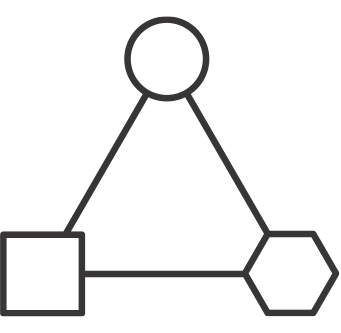
- Building inclusive and prosperous communities
Through our efforts to build inclusive and prosperous communities
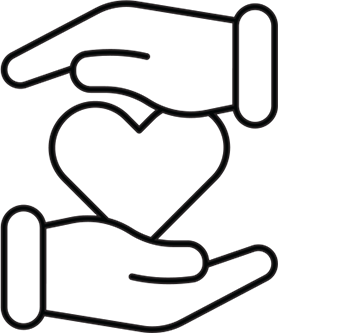
- Volunteering
Initiatives to get our team members connect more meaningfully with the communities we operate in
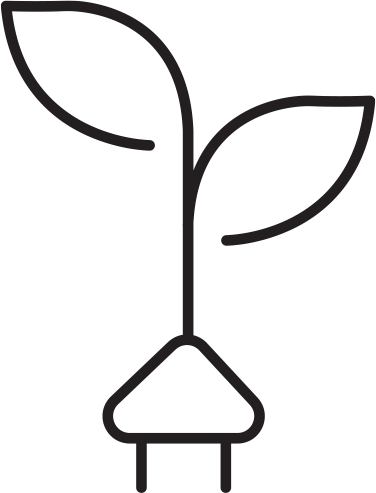
OPTIMUM USE
OF NATURAL
RESOURCES
As part of our Good & Green vision, we have established five environmental sustainability goals to be achieved by fiscal year 2020-21. We obtained the standards, methodologies, and assumptions used for the purpose of our calculations from the ‘IPCC Guidelines for National Greenhouse Gas Inventories, 2006’ and the ‘IPCC AR5 Assessment Report’.
Our emissions and data calculations are performed for all locations where we have 100 per cent operational control. All our manufacturing plants strive to achieve these goals by fiscal year 2020-21. Our performance is guided by the sustainability team at the corporate level and driven by manufacturing cluster heads and team members at each of our manufacturing locations.
For more details refer to Making our supply chain best in class > Sustainability of the process
Our approach
- Enhancing energy efficiency in our operations
- Replacing fossil fuels with renewables
- Process re-engineering
- Implementing carbon and water offset projects
- Diverting waste from landfill
OUR PROCESS
- Extensive meetings with multiple departments to align on priorities, budgets, and expected benefits for the year. Targets help drive environmental sustainability in our manufacturing process and achievement of Green goals
- Cascade an annual operating plan; sustainability targets are made part of the Key Responsibility Areas for ‘Green Champions’
- Internal sustainability monitoring tool periodically collects information and analyses data gathered; monthly reports on key indicators and calculate carbon footprint as per the set greenhouse gas (GHG) protocol
- Identify and circulate best practices for wider adoption
- Strategic improvement plan for underperforming units
OUR PERFORMANCE
- Energy - Reduced specific energy consumption by 30%
Approach - Improvements in processes and increase in efficiency of systems
Performance* - Reduced specific energy consumption by 28.7% - Water - Become water positive
Approach - Innovative water management systems and technological improvements
Performance* - Reduced specific water consumption by 26.3% - Waste - Achieve zero waste to landfill
Approach - Judicious and innovative use of materials, including reuse and recycling
Performance* - Reduced specific waste to landfill by 99.6% - Emission - Become carbon neutral
Approach - Adopting cleaner fuels such as biomass
Performance* - Reduced specific GHG emissions by 41.6% - Energy - Increase renewable energy portfolio to 30%
Approach - Adopting green energy sources such as solar and biomass
Performance* - Increased renewable energy portfolio to 30.7%
* Performance as on March 2019 against fiscal year 2010-11
1. Energy
Over the years, we have undertaken several energy- efficiency initiatives to help reduce energy consumption and dependence on conventional energy sources, in relation with our manufacturing scale. This has also reduced our GHG emissions.
Key initiatives in fiscal year 2018-19:
- Mostly use biomass briquettes as fuel across plants
- In Malanpur, we continue to install water-based vacuum systems by replacing steam-based vacuum systems. This has helped reduce steam consumption by 500 kg/hr.
- In Thana and Katha, we replaced the fixed speed air compressor with variable-speed drive
- Implemented several other energy-efficient measures globally, including converting to energy-efficient air conditioning, installation of energy-efficient LED lighting and motion sensor lighting, optimisation of pumps and motors, and automation panels to prevent idle running of machines
Share of renewable enery in energy mix (%) - India
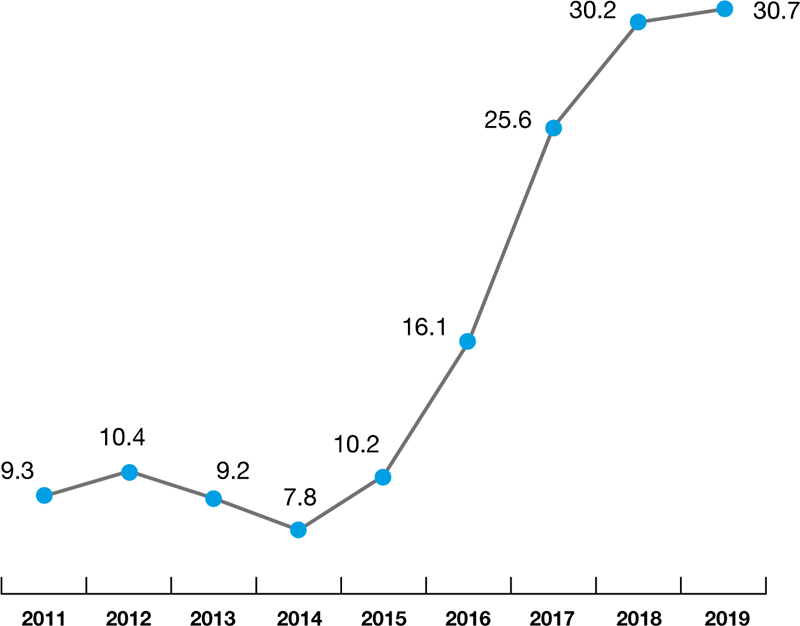
Specific energy consumption (MJ/MT) - India

Energy Report - Global
Indonesia - Specific Energy
by Product [MJ/t]
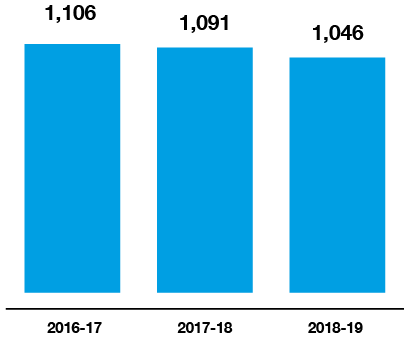
Africa - Specific Energy
by Product [MJ/t]
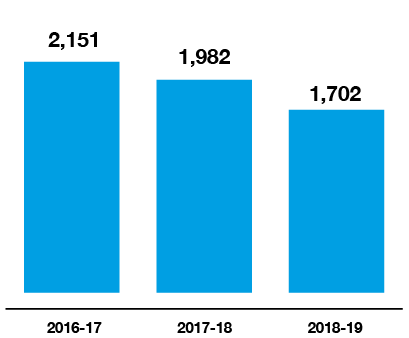
Latin America - Specific energy
by product [MJ/t]
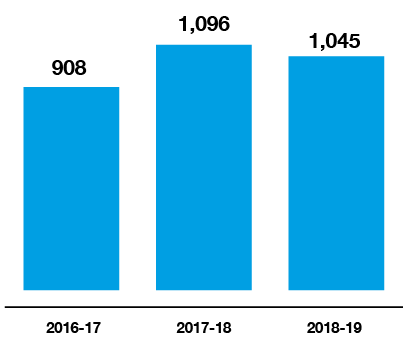
USA - Specific Energy
by Product [MJ/t]
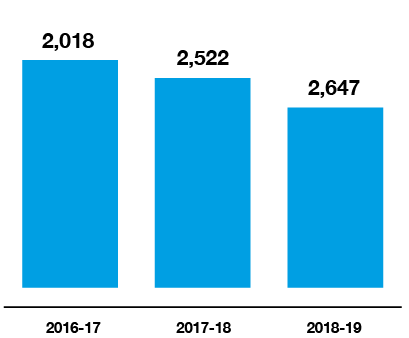
2. Water
We continually evaluate and execute innovative projects to reduce our specific water consumption. We also recognise that water procured has to be sourced from sustainable sources, and the rate of replenishment should exceed the rate of extraction.
Key initiatives in fiscal year 2018-19:
- In Thana, we replaced the water-cooled 250 CFM fixed air compressor with a 150 CFM variable speed drive type that will help save 200 KL of water per annum
- In the North and Northeast units in India, we changed to push-type water taps for basins
- In our Coil 9 unit in Puducherry, we are reusing 6,200 KL per annum of treated sewage water for plant processes and domestic purposes
Specific water withdrawal per metric tonne of production (litre/MT) - India

Specific water withdrawal per tonne of product (litre/MT) - Global
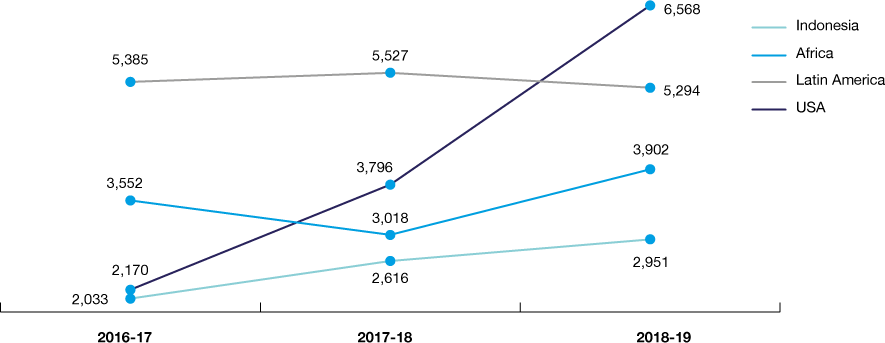
3. Waste
We recognise the need for proper treatment of the waste material generated through reuse or recycling. We have undertaken several initiatives to reduce waste generation and divert the waste from landfill to gainful applications. Therefore, we have already achieved over 99 per cent reduction in waste to landfill.
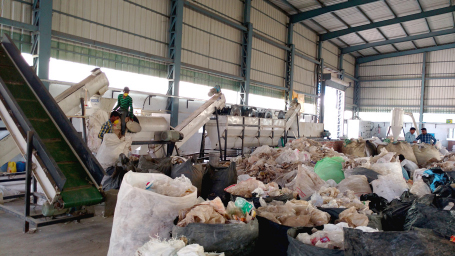
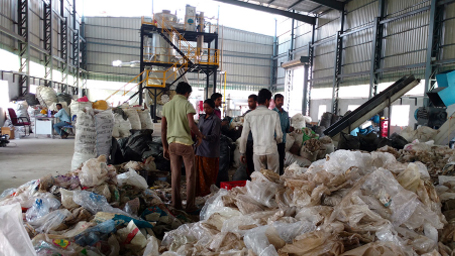
As part of our Extended Producer Responsibility commitment, we have collected an equivalent of 39% post-consumer plastic packaging waste
Specific Waste to Landfill (kg/MT) - India
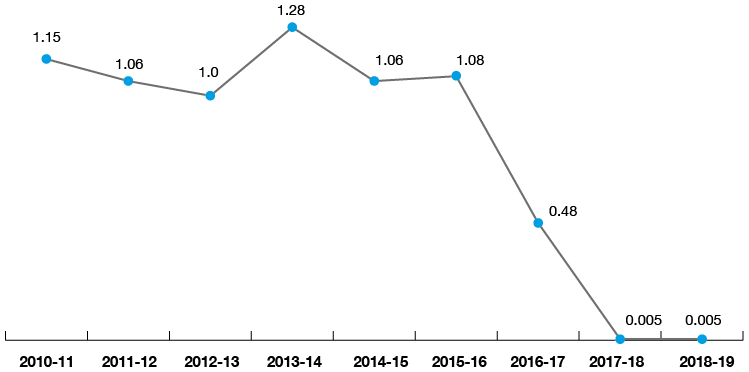
Specific Waste to Landfill (kg/MT) - Global
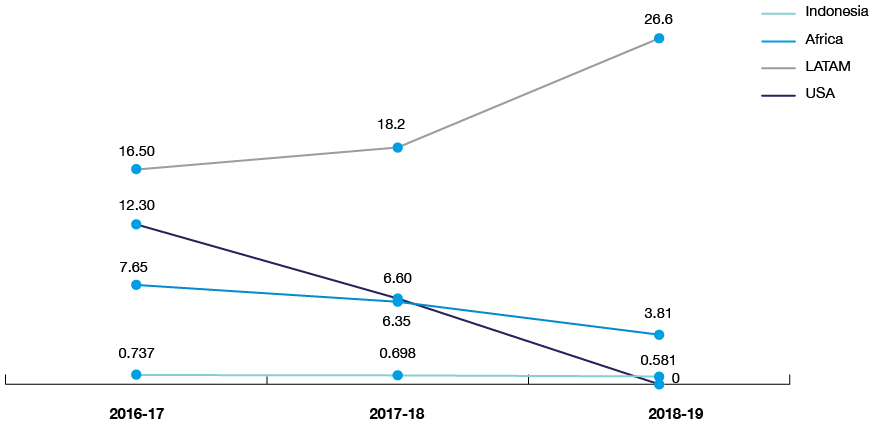
4. Emission
All our manufacturing units monitor their GHG emissions, and we have set short-term targets to reduce our emissions and achieve carbon neutrality. Our energy efficiency initiatives contribute to GHG emission reductions. Some include switching to renewable biomass for boilers, procurement of renewable energy, flue gas heat recovery from boilers and utilisation in the process, and installation of energy-efficient equipment.
GHG emission intensity per metric tonne production (kg CO2e/MT) - India*

Specific GHG Emissions per tonne production (kg CO2e/MT) - Global
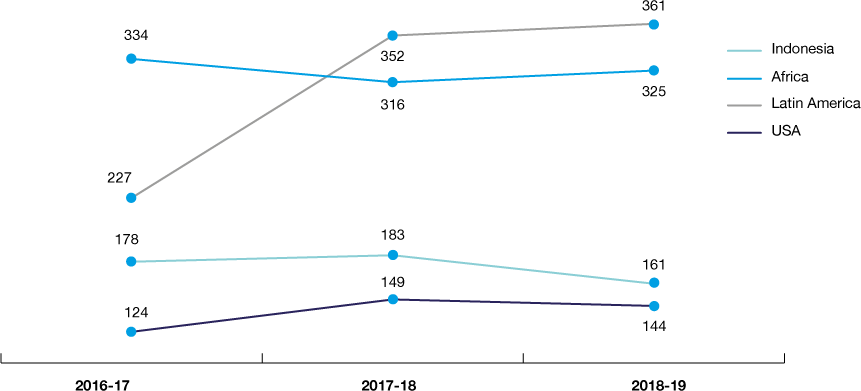
* Emission calculated from energy consumption within our operations

ANTICIPATING &
RESPONDING
TO EMERGING
REGULATORY
FRAMEWORKS
As an FMCG business, packaging plays a very important role in maintaining product integrity. We use delightful design and packaging as a way to differentiate our products, and we aim to do this in an eco-friendly manner. A number of our products are known for their unique packaging, which balances utility and recyclability.
OUR SUSTAINABLE PACKAGING TARGETS
In addition to our Good & Green targets, at a company level, we have identified sustainable packaging targets for fiscal year 2024-25:
- Reduce packaging consumption per unit of production by 20% from the base year of fiscal year 2017-18
- Have 100% of the packaging material recyclable, reusable, recoverable, or compostable
- Use at least 10% post-consumer recycled (PCR) content in plastic packaging
Our approach
- Innovation and technology upgradation
- Working in collaboration with research organisations and start-up enterprises to develop alternative packaging material to plastic and enable the use of recycled plastic in place of virgin material
OUR INITIATIVES
- Reduced the size of flow wrap in the Godrej Expert Rich Crème pouch by 10 mm, which has saved 19 MT per annum of material
- Reduced the size of our Nupur Henna sachet, which has helped us save 20 MT per annum of material
- Replaced the current wrapper of our Godrej No.1 soap with hotmelt wrapper to reduce our GSM coating. This helped save 30 MT per annum of material.
OUR PERFORMANCE
- 39% postconsumer plastic packaging waste equivalent collected as part of our extended producer responsibility (EPR) commitment
Specific packaging consumption (kg/tonne)
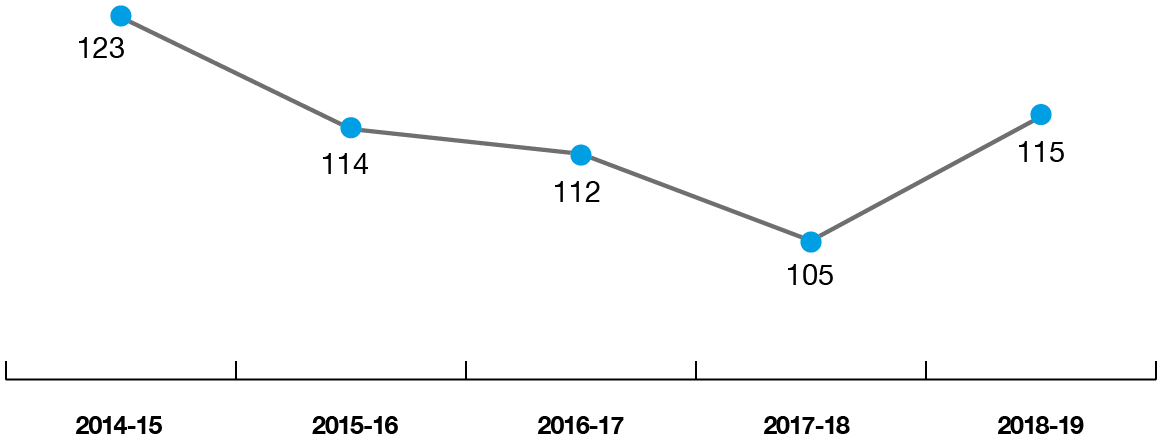
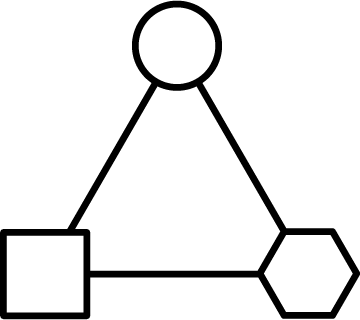
BUILDING
INCLUSIVE &
PROSPEROUS
COMMUNITIES
Our CSR initiatives are guided by Good & Green and reported under Schedule VII, Section 135 of the Companies Act, 2013 in the Board’s Report.
Our CSR policy outlines our focus areas, defines the scope of activities, and guides execution and monitoring. Furthermore, it focuses on addressing critical social, environmental, and economic needs of marginalised and underprivileged sections of society by adopting a shared value approach to help solve problems while strengthening our competitive advantage.
Drawing from the United Nations’ Sustainable Development Goals, we have developed programmes to address the issues of livelihood, public health, waste management, water, rural electrification and education, among others.
LIVELIHOOD
1. Salon-i and Beautypreneur
Programmes
Our flagship social initiative, Salon-i, is a vocational training programme for women. It is designed entirely in-house to train young women in basic skills of beauty, skin, hair care, and mehendi application. In addition, life skills and entrepreneurship development modules enable women to take up jobs or pursue self-employment depending on their unique skill sets and circumstances. Although Salon- i’s employability goal is small, compared to the country’s overall need, the programme is unique as it specifically aims at employability, entrepreneurship development, and empowerment of women.
We also reached out to women micro-entrepreneurs in the beauty and wellness sector in various parts of the country and set up the ‘Beautypreneur’ platform. Beautypreneur aims at developing beauty and wellness enterprises led by women, thereby enabling them to start training other girls. This is in addition to their regular salon business and thus helps them expand their enterprise.
SALON-i
- 500-hour training programme with audiovisual modules, life skills and entrepreneurship training
- Aimed at women between 18 and 30 years for employment or entrepreneurship
- Focuses on urban and peri-urban, socio-economically weaker sections of society
- Till date, approximately 2,20,000 women trained across 23 states with 22 non-profit partners
- Over 50% of trainees take up some form of employment
BEAUTYPRENEUR
- Aimed at developing beauty and wellness enterprises led by women
- Works with micro-entrepreneurs who want to increase profits and scale up businesses
- Applies market system approach and enhances technical skills
- Over 1,500 Beautypreneurs trained
- Social return on investment (SROI) yields a return of ₹6.4 for every rupee invested
Our Godrej Salon-i journey
2012-13
The beginning
5 PARTNERS 3 STATES
2,662 WOMEN REACHED

2013-14
Represented World Skill
Olympics (India Chapter)
18 PARTNERS 12 STATES
12,313 WOMEN REACHED

2014-15
Audio-visual curriculum ascribed to BWSSC launched
Trainer Training Modules created with emphasis on facilitation
23 PARTNERS 20 STATES
22,000 WOMEN REACHED

2015-16
Life Skills curriculum integrated discourses of Gender & Empowerment
28 PARTNERS 23 STATES
21,000 WOMEN REACHED

2016-17
Launch of the Beautypreneur
Programme
(Reached 95 Beautypreneurs)
5 PARTNERS 3 STATES
2,662 WOMEN REACHED

2017-18
Rural Udyogi Programme launched in West Bengal
300 BEAUTYPRENEURS ADDED
64,000 WOMEN REACHED
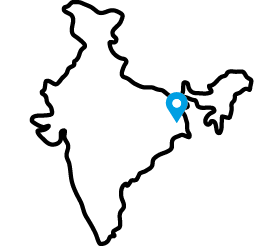
2018-19
Rural Udyogi Programme in Tamil Nadu
Study on SROI (Social Returns on Investment) undertaken
1,000 NEW BEAUTYPRENEURS
100,000 PLANNED TARGET OUTREACH
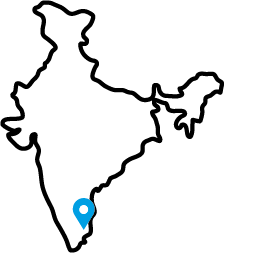
Need
Women, although a significant proportion of the workforce in India, are largely concentrated in the informal sector and engaged in vocations characterised by low earning, low productivity, poor working conditions, and lack of social protection. Despite a rise in India’s GDP, India’s female labour force participation rate has declined. Women aged between 21 and 50 years have a high dropout rate from the workforce.
Given these trends, women are financially dependent on others. Addressing gender inequality is therefore not only the right thing to do but also important for our future growth as an FMCG business. By promoting the formal and active participation of women in the economy, we aim to help build their lives, families, communities, and the economy.
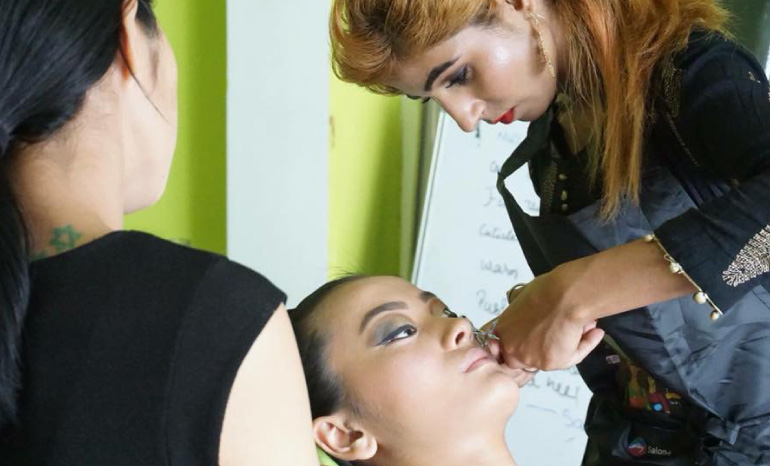
Our Beautypreneur programme works with micro entrepreneurs in the beauty and wellness sector
Our skill training programme works with the women and community to enhance their domain skills, while creating social and political awareness that helps them voice their opinions, negotiate their rights, and make their own decisions.
Trainees
We primarily work in peri-urban locations with:
- Low-income women who have dropped out of formal education
- Women from migrant families
- Women who have restricted mobility
- Women who are unclear about career paths and their options to become financially independent
- Women who face social obstacles to work
- Women who want to set up their own business but have no direction and access to funds
- Women who have set up a micro-enterprise and now want to scale up and increase their profits
Approach and market systems
We partner with non-profits and community-based organisations that work closely with communities and help in mobilising underprivileged women. The partner organisations implement the programme on ground, train them, and handhold them throughout the process.
The training curriculum (trainer manual, audiovisual content, assessment app, and other learning tools) has been developed entirely in-house. The entrepreneurship and life skills modules are at the core. We have also developed integrated activities and games to help trainees imbibe these concepts. We have a Learning Management System that enables blended learning through multimedia formats such as audio, video, PDFs and presentations.
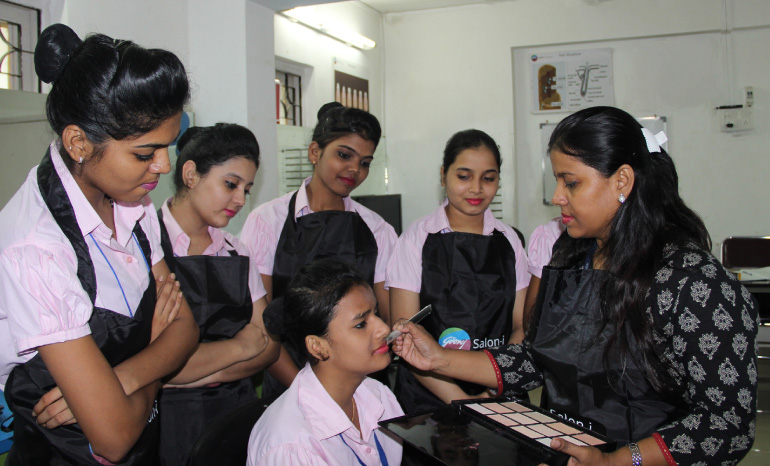
An SROI impact study for the Beatypreneur programme showed that every ₹1 invested in the programme generated over ₹6.4 in social impact value
Impact
Our third-party impact assessment of Salon-i showed that over 50 per cent of our trainees take up employment and over 25 per cent of them work from home in beauty-related trades. Those who work from home earn between ₹1,000 and ₹5,000 per month, whereas those with jobs earn upwards of ₹5,000 per month, depending on the number of hours, location, skill level, etc. For most of our alumni, this is their first skill-based income source, and many women are the first women in their families and/or communities to step out of the home for paid employment.
We recently completed a third party/independent SROI study of the Beautypreneur programme that showed an overall social return of ₹6.46 on the programme for every rupee invested. The study details performance on technical knowledge and personality development of trainees, financial and non- financial empowerment, entrepreneurial spirit, income change, shared value of being associated with Godrej, and outcomes of our NGO project implementation partners.
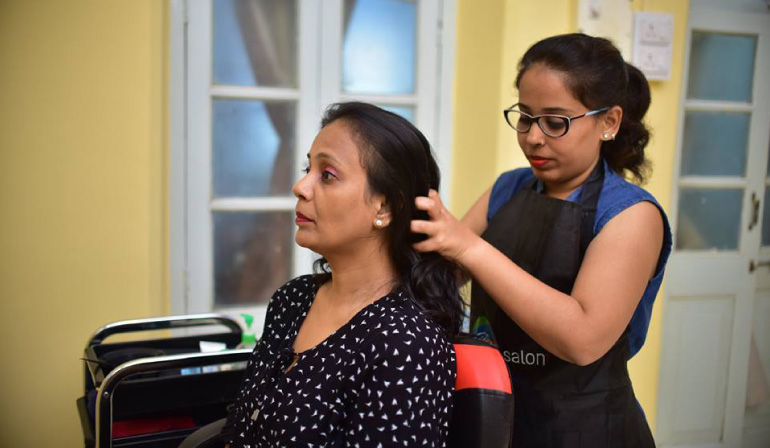
An SROI impact study for the Beatypreneur programme showed that every ₹1 invested in the programme generated over ₹6.4 in social impact value
2. Darling hair and beauty skills training in Kenya
Programme
We conduct hairdressing training for young women from underprivileged backgrounds at 11 hairdressing skills academies in Kenya (Nairobi, Machakos, Yatta, Athi River, Keumbu, Nyaore, Ngirisu, Awendo Marindi, Kitui, Rongo, and Kitale). This 14-week programme includes both theory and practical sessions. The focus is primarily on hair care and braiding.
Need and trainees
Unemployment is a major problem in Kenya today, especially for the youth. Data is inconsistent, with government figures reporting 7 per cent, Internal Labour Organisation stating 11 per cent, and a United Nations Development Programme report citing a whopping 39 per cent. In this scenario, women are worse off. According to the Kenya National Bureau of Statistics, only a third of Kenyans in formal employment are women.
Impact
We have trained over 4,500 women in five years. We are motivated by success so far reported by our alumni, several of whom have gone on to set up their own businesses (salons), and this is something we would like to facilitate for many more.
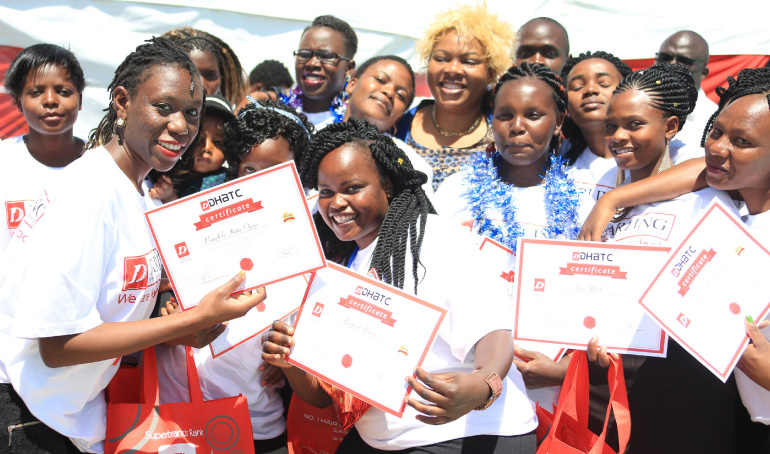
Our Darling hair and beauty skills training programme helps women gain employment
RURAL INTENSIFICATION
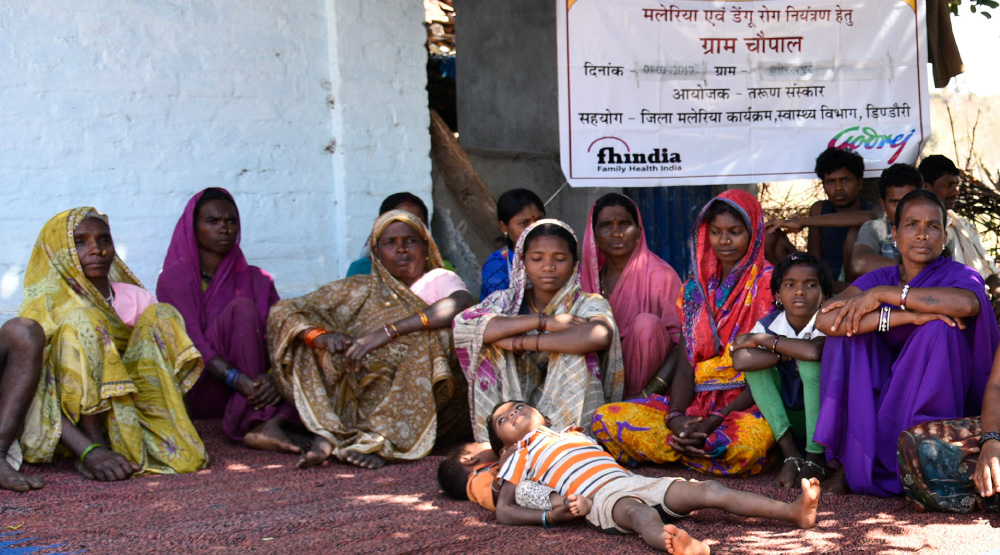
Project EMBED aims to eliminate malaria by creating awareness and driving behaviour change
As a corollary to the employability and livelihood programme, we set up a project to identify and train unemployed women and youth in entrepreneurship skills to ensure stable livelihoods.
The programme aims to provide an additional source of income to the youth, especially women. Rural households typically earn an average of ₹6,500 per month, and many live below the poverty line. It involves intensive mobilisation and a year-long handholding period to ensure that they succeed at their entrepreneurial ventures.
Youth are primarily provided training in different aspects of rural retail business and entrepreneurship. This is to train them to be mobile retailers or door-to-door salespeople. Eventually, some of them can set up a permanent store or even become local area stockists. In two years, over 1,270 youth have been trained as part of this project in West Bengal and Tamil Nadu.
PUBLIC HEALTH

Elimination of Mosquito-Borne Endemic Diseases (EMBED)
Programme and need
EMBED is a great example of how we are using shared value principles to further both business and social needs. Introduced in Madhya Pradesh in 2015, EMBED followed a feasibility study on Indian states that had a high incidence of vector-borne diseases, such as malaria and dengue.
On analysing the problem, we realised that specifically, households and people at the bottom of the pyramid suffer from vector-borne and other diseases. To address this, we collaborated with non-profit organisations and the state government to run intensive behaviour change programmes in nine districts of Madhya Pradesh. We are also working with vulnerable and marginalised groups in tribal, hilly, and hard-to-reach areas to spread awareness about diseases.
Impact
- The programme currently addresses 45 per cent of the malaria burden in Madhya Pradesh across nine districts, 3,000 villages, 700,000 households, and 3,500,000 people
- In Phase I, 209 ASHA workers, 77 rural healthcare providers, 655 traditional healthcare providers, and 156 community volunteers have been trained on correct diagnosis treatment and/or referral of malaria cases
- On the basis of government data from 2015 to 2017, at the end of the third year (intervention in nine districts), 81% of the targeted intervention villages had no malaria cases.
WASTE MANAGEMENT
Programme
Our efforts towards solid waste management extend beyond our manufacturing plants and immediate areas of operations. As part of our CSR efforts, we have commissioned and introduced community waste management projects by using circular economy principles. For example, we have collaborated with Hyderabad and Kalyan-Dombivali Municipal Corporations to implement community waste management projects.
Need
Waste disposal has hazardous impacts on the environment and society, particularly in developing countries, such as India, where over 150,000 tonnes of municipal solid waste is generated per day. Solid waste accumulation is an increasing problem due to unsustainable waste management practices and lack of proper waste treatment.
Approach
We have adopted a multi-stakeholder approach, designed to be economically viable, environmentally oriented, and socially inclusive.
- Stakeholder engagement: Work with municipal corporations and municipalities to institute sustainable solutions and civil society organisations as well as social enterprises to identify and establish long-term projects.
- Citizen's ownership: Citizens need to take ownership of municipal solid waste management, and adoption of sustainable practices is crucial to success.
- Tripartite partnership: Local municipality commits to providing land for segregation activities and recycling. Godrej invests in technology, whereas social entrepreneurs invest in other capital expenditure. This tripartite partnership ensures that the entrepreneur has a higher chance of success.
- Financial sustainability: It is essential that the project has built-in revenue streams to ensure long-term financial sustainability. Revenue can come from composting wet waste, selling recycled products, converting plastic to pellets for recycling, etc.
- Social inclusion: Segregation and recycling relies heavily on informal workers who collect, sort, and recycle the waste. Social inclusion projects cater to waste pickers by integrating them into the formal system, as well as providing safe working conditions, social safety nets, child labour restrictions, etc.
Impact
The projects helped divert over 25 MT of waste per day from landfill at each location. They are tackling different waste streams and demonstrating effective waste management solutions. However, the approach remains the same across locations, partners, and projects. Each type of waste is further segregated and made into final products that are fed as inputs to other industries, in line with the principles of circular economy.
RURAL ELECTRIFICATION
Programme
We provide decentralised, off-grid renewable energy systems through community-level installations in rural India.
Need
Electricity is central to development in any modern economy. While access to electricity has improved over the years, in several of India’s remote locations, severe shortage of electricity continues to hinder daily life and full-fledged development.
Approach
The installation and commissioning of micro-grids generate employment both for unskilled and skilled labour. We employ unskilled people for mechanical and civil works, such as erecting module mounting structures, solar modules, and the civil foundation.
We have also trained selected people on the installation and commissioning of micro-grids. These trained professionals will be responsible for maintaining the micro-grids and imparting the training to other youth in their communities.
Impact
This programme is one of the few that has the power to transform lives from the day the systems come into place. The domestic micro-grids bring light to homes, which ensures that children can study in evenings, women can cook in safety, and community members have longer productive hours to engage in other income-generation activities.
Although the initiative is primarily aimed at domestic electrification, a few micro-grids also provide energy for water pumps, which enables marginal farmers to grow more than one crop and almost double their income within 1-2 years. Hundred energy-dark villages in Andhra Pradesh, Madhya Pradesh and Uttarakhand are now powered by mini and micro grids sponsored by us.
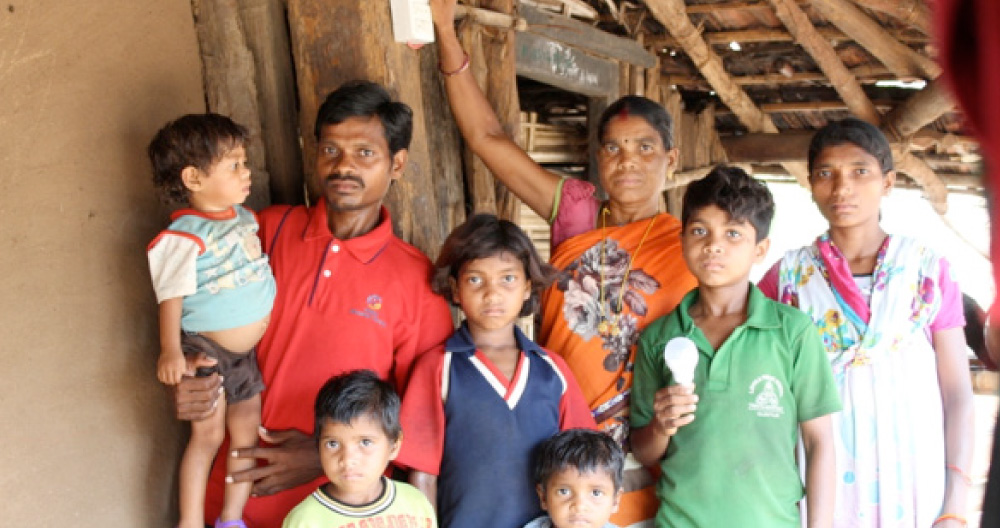
Through our rural electrification initiative, we provide decentralised, off-grid renewable energy systems
WATERSHED MANAGEMENT
Our integrated watershed development project will help restore the ecological balance in the drought-prone district of Siddipet in Telangana. Currently, groundwater levels are lower than 400 ft in many areas; as a result, farmers are under acute pressure.
Our efforts are designed to recharge groundwater and make more water available for irrigation over a total area of over 3,300 hectares and plantation of approximately 4,00,000 saplings. We have completed the capacity building phase and will begin full implementation in fiscal year 2019-20.
We are partnering with NABARD and PEACE, a local NGO, to work with local communities to ensure their buy-in, create civil structures to capture rainwater at appropriate places, build capacity of local communities in water management, and train on sustainable agricultural practices.
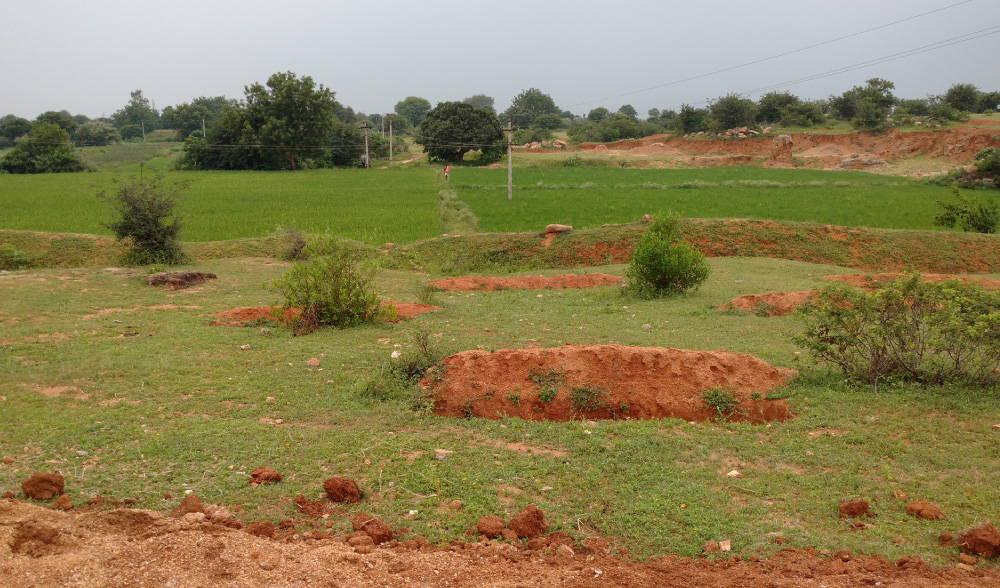
Dugouts built by the residents of Seddipet, Telangana, as part of our watershed programme
COMMUNITY INITIATIVES
After receiving valuable stakeholder input from third-party community needs assessments at our priority plant locations, we are now implementing a range of high-impact community development programmes on social and environmental aspects. These are focused on improving education, water, health, and sanitation and skill building initiatives in and around our manufacturing facilities.
DONATIONS
Every year, we make strategic donations to support skill development, employability, sports, arts and culture, and critical cancer ailment support.
For more details, please refer to the Board’s Report

VOLUNTEERING
Our multi-faceted volunteering platform provides a range of opportunities for Godrejites to contribute their time and skills in community activities.
BRIGHTER GIVING
These are long-term volunteering opportunities to help make a meaningful impact. Every year, volunteers take up projects that address the needs of a nonprofit. We partner with Goodera and iVolunteer to scope and source these projects that range from building an NGO’s marketing plan to helping revamp their websites and recruit for their leadership roles.
GODREJ GLOBAL VOLUNTEERING DAY
This is our annual day of community service. In 2018, over 1,120 of our team members across the globe volunteered their time to improve teaching and learning experiences in 38 schools and institutions. They conducted engaging activities and reached out to over 5,230 children. Our theme was around ‘Dreams’, and volunteers helped children explore their aspirations and talents. Most children we engaged with are first-generation learners from their family, and through this interaction, we hoped to encourage them to grow into passionate and well-rounded individuals.
In Mumbai, we took a step further and hosted our very first Godrej LOUD for Kids, an extension of our Live Out Ur Dream (LOUD) platform to children from our volunteering partner schools. In total, 300 Mumbai volunteers engaged with over 2,000 students. We received an overwhelming response with over 1,700 applications that ranged from education support, career guidance, and mentorship to sports coaching, art training, and support for social development initiatives.
The finale brought students together to share their dreams and their plans to achieve them. We chose nine winners across six schools who will go on to live out their dreams in the next year.
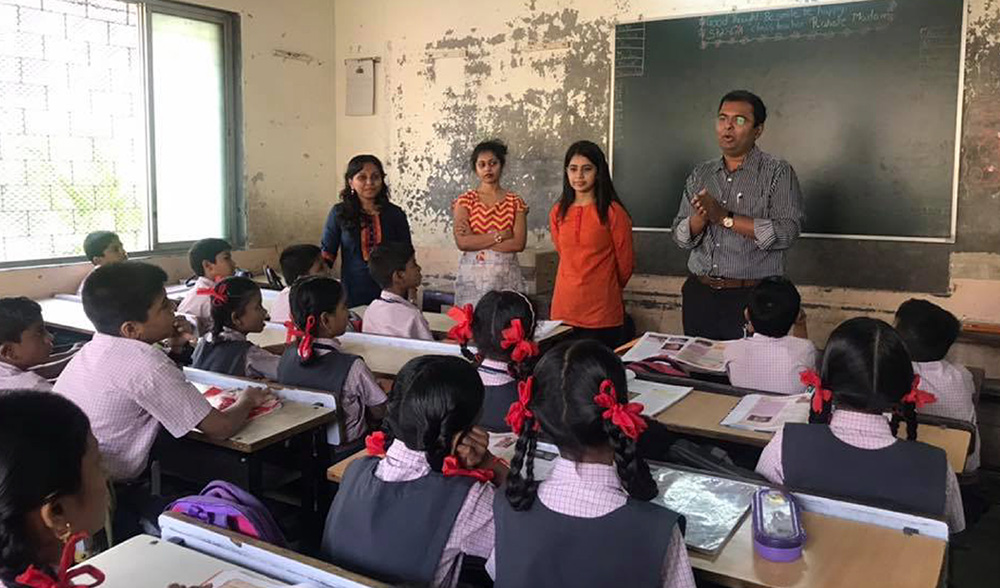
Talking to children about their aspirations at schools in India on Godrej Global Volunteering Day 2018
MUMBAI MARATHON
In January 2019, 47 of our Godrej Group team members completed the Tata Mumbai Marathon in support of Teach for India and raised over ₹9,00,000 to bring quality education to children from low-income families across India.
WORLD ENVIRONMENT DAY
Every year, on World Environment Day, our team members host celebrations and spread awareness about the effects of our actions on the environment. We organise tree plantation drives around the communities of our manufacturing plants, cleanliness drives in collaboration with local panchayat and municipal corporations, and awareness sessions in local schools among other activities. In fiscal year 2018-19, over 830 of our team members participated in these activities.
PAYROLL GIVING
Our team members support our three non-profit partners directly through payroll giving. In fiscal year 2018-19, 48 Godrejites contributed approximately ₹3,00,000 in support of education, health, and safety of children and environment preservation and conservation.
As a part of our disaster relief efforts, we provide support to areas affected by natural disasters through contributions from Godrejites and matching grants from the Group. In 2018, our employees contributed ₹20,03,982 towards flood relief efforts in Kerala.




